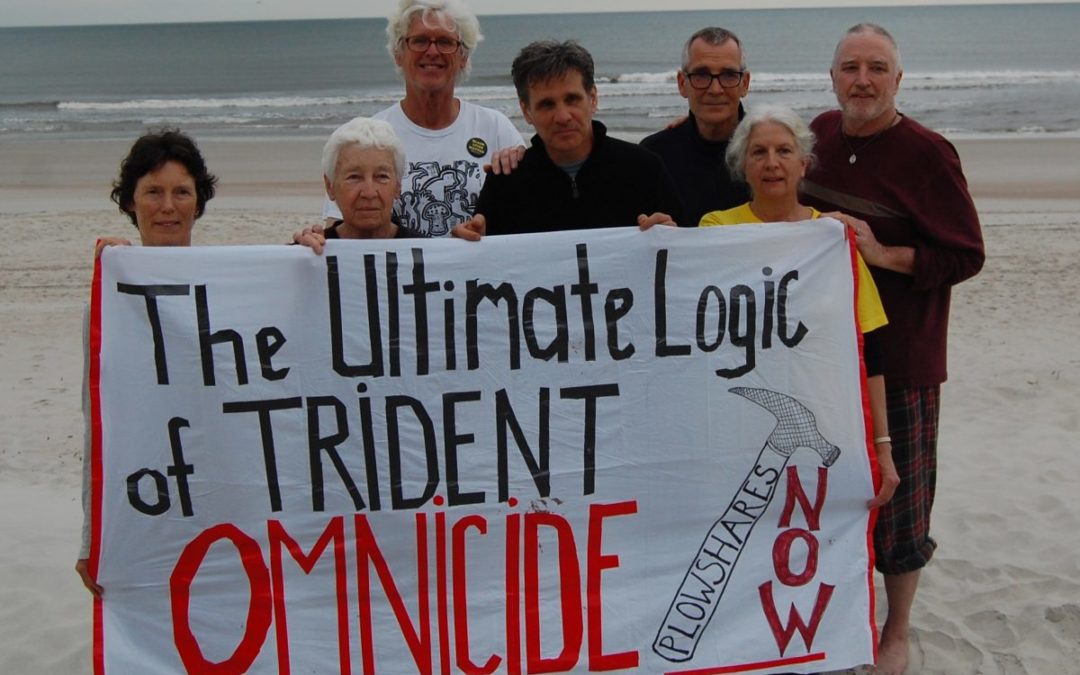Inside a sterile, but lavish wood paneled courtroom in Brunswick, Ga. Monday, the Kings Bay plowshares seven, formally opened their legal argument, providing hints to what Judge Lisa Godbey Wood would allow.
The government, represented by Assistant U.S. Attorney Karl Knoche, objected three times during the opening statements presented by Clare Grady and defense attorney Bill Quigley, who spoke on behalf of Elizabeth McAlister.
The first objection was made against Quigley, who hypothetically asked if an act of “symbolic disarmament,” the term used by the plowshares to describe their action at the Kings Bay base, should be worthy of prison time. Wood interjected, reminding jurors that “punishment will not be considered” in their deliberation over the evidence presented in the trial.
Following Quigley’s opening on behalf of McAlister, Clare Grady, addressed the jury. She described her family, service work and love for the outdoors.
“I love being out in the natural world, not in jail,” she said prompting Knoche to slowly utter an objection.
“I’m sorry, that wasn’t even in my notes,” Grady piped. She added that she would like to go back to Ithaca, N.Y. to harvest garlic and weeks in the community garden and moved on with her remarks.
She continued on for several minutes, but when she started discussing the legality of nuclear weapons, Wood’s gaze moved on her like a hawk, waiting for an objection from Knoche at any moment. Just as Grady began to quote from Isaiah, Knoche objected, Wood, began to acknowledge the objection, but before she could Grady wrapped up, leaving the stand.
In pre-trial hearings, the defense acknowledged it would try to make several arguments as to why the activists actions are legal, the same arguments that have been made in plowshares actions dating back to the 80’s: the action was necessary to prevent an immediate threat to the world, the possession of nuclear weapons is against the group’s pacifist religious practices, and that possessing nuclear weapons was against international law. The court, as all have done in the past, ruled that the plowshares defendants could not pose these arguments during trial.
As the clock was nearing 5:00 p.m., Wood decided to dismiss the jury to their quarters before adjourning the court.
As soon as they left the room, Wood took to addressing the defendants, attempting to draw the lines of what was permissible under the restriction of arguments.
“I am trying to give you as much leeway as possible,” Wood said, adding “this is not a forum to convert people to a particular religion.”
The physical courtroom audience was void of all but four members of the media as marshalls did not transfer the occupants of an overflow room after the majority of jurors had been dismissed.
That process took most of the day, with the 14 jurors only locked in at 3:49 p.m.. During the selection, the presence and impact of the Kings Bay base and military as a whole hold in the community.
At times, jurors were asked if they had been employed by the government, visited the Kings Bay base recently, and if they already knew about the action by the plowshares activists. 18 had been employed, 11 visited, and a staggering 24 already knew about the case. But of the roughly 70 jurors, none indicated that they “had strong opinions about nuclear weapons.”
“That kinda says something about the community at large, right? This is not a matter of importance to people,” defendant Pat O’Neill said outside the courthouse. “So that’s why we’re here.”

